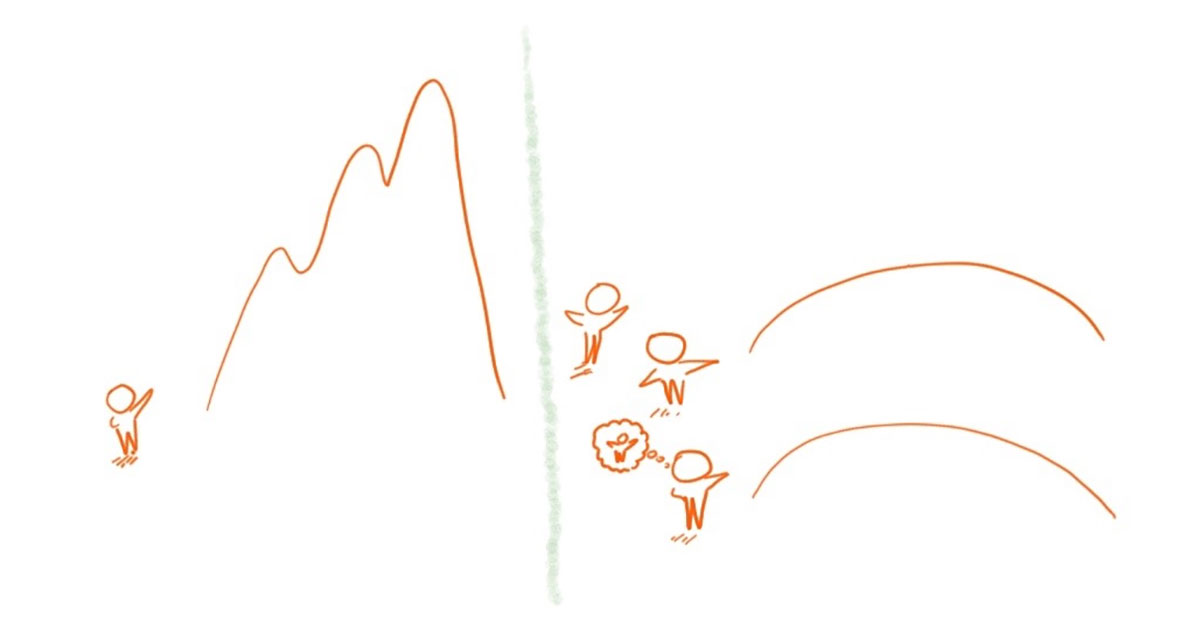Social Support Makes Challenges Easier
Is it surprising that a hill seems less steep when we are rested, in shape, or younger?

Or, that a hill appears steeper and distances appear greater when we are tired and depleted? Research has shown that our physical resources such as fitness, age, and feeling refreshed influence our visual perception.1, 2
How does social support affect visual perception?
Researchers, Schnall, Harber, Stefanucci & Profitt3 set out to answer that question and here is what they discovered:
- Participants accompanied by a friend, when standing in front of a hill, estimated the hill to be 10 to 20% less steep than participants who were alone (even though that friend was standing three feet away, facing the other way, and not talking).
- Second, having people simply think of a "supportive person" led participants to see a hill as 10 to 20% less steep. Further, the relationship quality is important. When the perceived closeness, warmth or positive regard for our support person increases, our perceived steepness of the hill decreases.
We know that the mere presence of another person can be beneficial, especially if the person provides non-evaluative and nondirective support. This "buffering hypothesis"4 finds that social support is protective against issues like the common cold5, heart disease6, and even cancer7.
Why is this important? When executive coaches work with a leader, too often they are focused on just that one person. However, we think it is important for a coach to engage the client's "people system;" to uncover and engage allies of support for the client and the changes they are trying to make. With someone by our client's side, those changes and challenges will become less daunting.
We love the researchers' note as they conclude their article, "If social support, opportunities for emotional disclosure, and differences in hope, optimism, self-worth, and self-efficacy cause people to see challenges in a more moderate way, then people who enjoy these resources will live in a subjectively less demanding and less stressful world. Conversely, those deprived of such resources will live in a world where hills are steeper, distances greater, precipices deeper, and other kinds of physical challenges more daunting and demanding."
Shift Positive 360 Certification
Learn how you can use positive psychology and create allies on behalf of your client to help make challenges a little easier and create a constructive and supportive culture.
- Bhalla, M., & Proffitt, D. R. (1999). Visual-motor recalibration in geographical slant perception. Journal of Experimental Psychology: Human Perception and Performance, 25, 1076–1096.
- Proffitt, D. R., Stefanucci, J., Banton, T., & Epstein, W. (2003). The role of effort in perceived distance. Psychological Science, 14, 106–112.
- Schnall, S., Harber, K. D., Stefanucci, J. K., & Proffitt, D. R. (2008). Social support and the perception of geographical slant. Journal of Experimental Social Psychology, 44, 1246-1255.
- Thoits, P. A. (1986). Social support as coping assistance. Journal of Consulting and Clinical Psychology, 54, 416–423.
- Cohen, S., Doyle, W. J., Turner, R., Alper, C. M., & Skoner, D. P. (2003). Sociability and susceptibility to the common cold. Psychological Science, 14, 389–395.
- Seeman, T. E., & Syme, S. L. (1987). Social networks and coronary artery disease: A comparison of the structure and function of social relations as predictors of disease. Psychosomatic Medicine, 49, 341–354.
- Fawzy, F. I., Fawzy, N. W., Hyun, C. S., Elashoff, R., Guthrie, D., Fahley, J. L., et al. (1993). Malignant melanoma: Effects of an early structures psychiatric intervention, coping, and affective state on recurrence and survival 6 years later. Archives of General Psychiatry, 50, 681–689.
